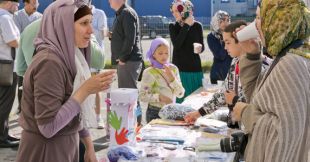Analytics, EU – Baltic States, Legislation, Society
International Internet Magazine. Baltic States news & analytics
Friday, 26.04.2024, 11:25
Latvia can accept 50-60 refugees, Estonia about 100, Lithuania 250
 Print version
Print version |
|---|
This is the number that the interior system can take in with its current resources. If more funding is allocated, an additional number of refugees could be accepted.
Kozlovskis stressed that no country will be forced to accept refugees. Each state will decide the number of refugees it can take in. This will concern persons who are persecuted and whose lives are in danger in their native countries.
The minister stressed that it would be important not only to accept the refugees, but also to integrate them in society.
Prime Minister (Unity) previously told media representatives that Latvia ought to accept refugees as the country cannot evade joint responsibility and solidarity of the European Union (EU) in this matter. Laimdota Straujuma.
The prime minister reminded that EU leaders agreed upon a voluntary principle, however, a specific mechanism on how to deal with this problem will be agreed upon in July.
Lithuania is ready to voluntarily accept 250 refugees from Africa and the Middle East. However, it will probably be forced to accept more. The criteria of relocation of immigrants in European Union (EU) member states should be outlined by the end of July, writes LETA/ELTA.
The criteria will be based on such factors as gross domestic product (GDP) and population size. The criteria system was proposed instead of the quota system which was opposed by Poland, the Czech Republic, Slovakia, Hungary and other countries. These countries said that their post-socialist economies were too weak to handle the number of immigrants suggested to receive. "There is a danger that once it is compulsory to receive refugees, then it will become a tradition to solve other issues on a compulsory basis as well. After all, the voluntary principle was discussed initially in this case, but later the European Parliament's resolution talked about mandatory quotas," MEP Rolandas Paksas told the daily Vakaro Zinios.
According to the MEP, the Government made the decision to accept 250 refugees without discussing this at the Political Council of the ruling coalition, while President Dalia Grybauskaite was the first to mention this number. Paksas says it is unclear where so many refugees will be housed because as much as 30,000 Lithuanian families are waiting in line for social housing. "I know only two places where they could live. The first one is Turniskes (a gated community where the president resides – ELTA). They can live there if we succumb to pressure so easily and without thinking. The second place is the European Parliament in Strasbourg. Many more could live there," said the MEP. He reminded that each year over 150,000 refugees arrive to Europe and warned that if the EU opens its doors to them legally, then "Europe will become full pretty soon".
Meanwhile, Signatory of the Independence Act Audrius Butkevicius says that it should be considered how to improve the situation in Africa, but not how to relocate Africans to Europe. "None of the refugees will integrate, none of them has qualifications to earn money, so all of them will become freeloaders. Allowing them entry into Lithuania would be unfair in regard of the locals, for example those who are waiting for social housing," said Butkevicius.
Minister of Internal Affairs in Estonia Hanno Pevkur earlier stated, when answering a question from ERR news portal, that Estonia is voluntarily prepared to receive 84-156 refugees, writes the National Broadcasting.
He explained that this number complies with Estonia's size and capacity. Estonian Government does not have a mandate from the Parliament to pledge any higher numbers.
Estonia's GDP accounts for 0.14% of the EU GDP, and Estonia's population is 0.26% of the EU population. As 60,000 refugees will need to be relocated and resettled, in the context of these two facts Estonia's voluntarily received number of refugees would range from 84 (on the basis of GDP) to 156 (on the basis of the population).








 «The Baltic Course» Is Sold and Stays in Business!
«The Baltic Course» Is Sold and Stays in Business!

